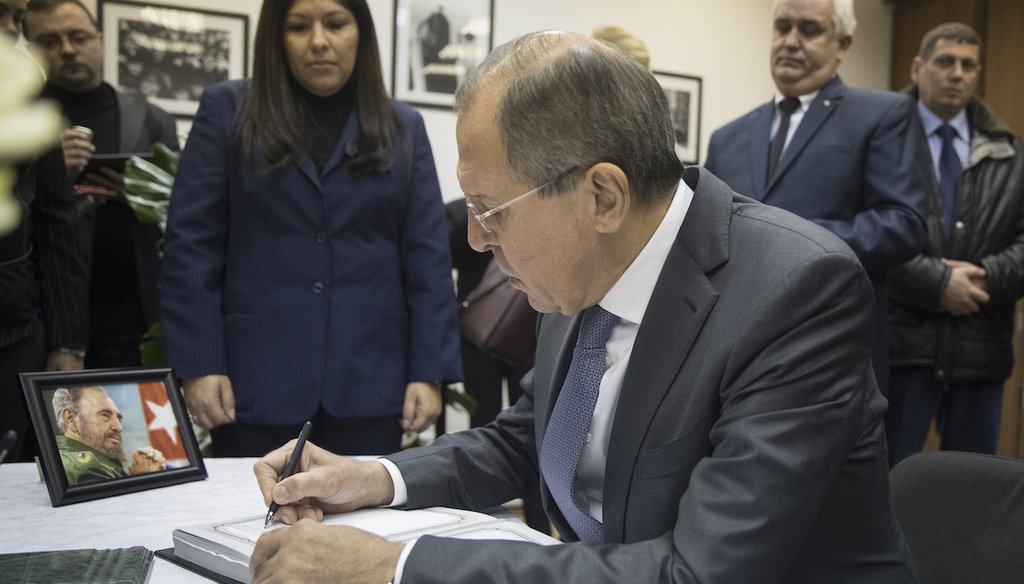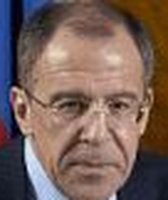Stand up for the facts!
Our only agenda is to publish the truth so you can be an informed participant in democracy.
We need your help.
I would like to contribute

Russian Foreign Minister Sergey Lavrov writes a message for the late Cuban leader Fidel Castro in a book of condolences at the Cuban Embassy to Russia on Nov. 29, 2016. (AP)
Russian has not been banned in Ukraine, despite repeated claims
If Your Time is short
-
Ukraine has not banned the use of the Russian language in the country.
-
A 2019 law established Ukrainian as the official language of Ukraine and strengthened its use in businesses, schools and the media.
Russia Foreign Minister Sergey Lavrov recently doubled down on an inaccurate statement he’s made before: that Ukraine banned the Russian language.
During a press conference on June 6, Lavrov said Ukraine adopted "laws banning the Russian language," claiming the Russian language was prohibited in "education, the media, everyday contacts, etc." Lavrov mentioned that if English had been banned in Ireland or French in Belgium, Europe would have responded differently.
But Lavrov is mischaracterizing a Ukrainian language law. It does not ban Russian from the country.
In April 2019, Ukraine’s parliament approved a language law making Ukrainian the mandatory language for public sector workers. The adoption of this law required citizens to know Ukrainian and obliged civil servants, soldiers, doctors and teachers to communicate in Ukrainian.
Some exceptions were made under the law for some minority languages like English and other European Union languages. The Russian language does not fall under this category.
In January 2022, a new provision of the law was introduced, under which print media outlets registered in Ukraine were required to publish in Ukrainian. This did not ban publications in other languages. Instead, the law required that all content also be published in Ukrainian.
Again, exceptions under the provision were made for certain languages like English and other official European Union languages, but not Russian.
There have been concerns over whether the protections for minority languages under the law are sufficient. An advisory body of the Council of Europe, focusing on constitutional law, published a report in 2019 on the Ukrainian language law. It is the fourth Ukrainian language policy the commission has assessed over the years.
In the report, the commission notes the need for Ukraine "to adopt measures to promote the use of Ukrainian as the State language," because of its history.
However, it also explains that the policy does not balance strengthening Ukrainian with implementing enough protections for minority languages in the country, like Russian.
According to the Washington Post, about 50% of Ukrainians speak Ukrainian at home, and around 30% speak Russian primarily.
Ukraine’s language law, which has been implemented in phases, establishes Ukrainian as the country’s sole state language. The law requires Ukrainian to be primarily used in business, school and media settings. However, it does not ban the use of Russian or other languages.
Our ruling
Lavrov referenced the banning and prohibition of Russian in Ukraine, particularly in "education, the media, everyday contacts," during a press conference.
Despite a language law that establishes Ukrainian as the country’s official language and prioritizes its use in civil society, Russian has not been banned.
We rate Lavrov’s statement False.
Our Sources
The Ministry of Foreign Affairs of the Russian Federation, press conference, June 6, 2022
Reuters, Ukraine passes language law, irritating president-elect and Russia, April 25, 2019
The Washington Post, War impels many in Ukraine to abandon Russian language and culture, April 12, 2022
The Washington Post, The Ukrainian language is having a moment. To Putin’s ears, it’s a shot against Russian speakers, February 8, 2022
Human Rights Watch, New Language Requirement Raises Concerns in Ukraine, Jan. 19, 2022
The Brussels Times, Russian Foreign Minister: ‘What would France do if Belgium banned French?’, May 30, 2022
European Commission for Democracy Through Law, On the Law Supporting the Functioning of the Ukrainian Language as the State Language, Dec. 9, 2019
Browse the Truth-O-Meter
More by Maria Ramirez Uribe
Russian has not been banned in Ukraine, despite repeated claims
Support independent fact-checking.
Become a member!
In a world of wild talk and fake news, help us stand up for the facts.






































